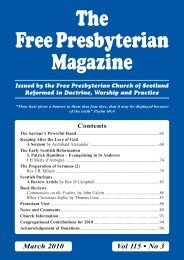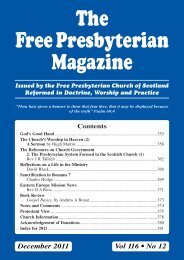April - the Free Presbyterian church of Scotland
April - the Free Presbyterian church of Scotland
April - the Free Presbyterian church of Scotland
You also want an ePaper? Increase the reach of your titles
YUMPU automatically turns print PDFs into web optimized ePapers that Google loves.
Benefits <strong>of</strong> <strong>the</strong> Reformation to <strong>Scotland</strong> 107and for all men it is <strong>the</strong> fa<strong>the</strong>r’s rod, ever in a readiness to chastise gently <strong>the</strong>faults committed, and to cause <strong>the</strong>m afterward to live in more godly fearand reverence.” 4Although <strong>the</strong> word discipline has acquired negative connotations, it hasa positive origin in various Latin words that mean to learn. Thus it meansinstruction, nurturing and training as well as chastisement and correction,which is <strong>the</strong> way that Scripture uses <strong>the</strong> word. By means <strong>of</strong> discipline anindividual is brought to a knowledge <strong>of</strong> himself, repentance and change <strong>of</strong> life.Discipline is not punishment according to <strong>the</strong> exacting demands <strong>of</strong> <strong>the</strong> law,but like firm and loving parental discipline exercised as a means <strong>of</strong> faithfulinstruction; it is intended to reform those who are in disobedience to God andHis truth and to deliver <strong>the</strong>m from <strong>the</strong> consequences <strong>of</strong> that disobedience. Itis <strong>the</strong> rod <strong>of</strong> correction tipped with <strong>the</strong> honey <strong>of</strong> mercy.If we know a little <strong>of</strong> <strong>the</strong> discipline exercised by <strong>the</strong> Reformers, we arelikely to think <strong>of</strong> <strong>the</strong>ir use <strong>of</strong> public repentance as a means <strong>of</strong> chastising <strong>the</strong><strong>of</strong>fender. In this <strong>the</strong>y followed fully <strong>the</strong> requirement <strong>of</strong> 1 Timothy 5:20:“Them that sin rebuke before all, that o<strong>the</strong>rs also may fear”. Various means,however, were used with restoration in view and it was necessary “that allpunishments, corrections, censures, and admonitions stretch no far<strong>the</strong>r thanGod’s Word with mercy may lawfully bear”. 5Discipline was flexible and sensitive in relation to individual cases. Accordingto <strong>the</strong> gravity <strong>of</strong> <strong>the</strong> matter, <strong>the</strong>re could be private admonition as well aspublic action. There were also occasions when <strong>of</strong>fenders were “admonished”or “rebuked” in front <strong>of</strong> <strong>the</strong> kirk session ra<strong>the</strong>r than before <strong>the</strong> congregation.David Black, as minister <strong>of</strong> St Andrews, was well known for his emphasison faithful discipline, but he declared that “loving censure” was <strong>the</strong> bestcourse <strong>of</strong> action in some cases in order that “<strong>the</strong> <strong>of</strong>fender would ra<strong>the</strong>r beravished with <strong>the</strong> admiration <strong>of</strong> God’s grace in us, than ei<strong>the</strong>r sc<strong>of</strong>f [at] it orgrow into a choler [become angry], as many do”. 6Secular historians are forced to admit that <strong>the</strong> discipline exercised by kirksessions was notably impartial. The First Book <strong>of</strong> Discipline asserted that “todiscipline must all <strong>the</strong> estates within this realm be subject, as well <strong>the</strong> rulersas <strong>the</strong>y that are ruled; yea, and <strong>the</strong> preachers <strong>the</strong>mselves, as well as <strong>the</strong> poorwithin <strong>the</strong> kirk”. As <strong>the</strong> General Assembly laid down in 1562, discipline mustbe “without exception <strong>of</strong> persons”. 7 This was manifested in 1567, when <strong>the</strong>4 The Book <strong>of</strong> Common Order, ed J Cumming, London, 1840, p 118.5 The Book <strong>of</strong> Common Order, p 122.6 Quoted in John McCallum, Reforming <strong>the</strong> Scottish Parish: The Reformation in Fife, 1560-1650, Ashgate, 2010, p 225.7 Quoted in Todd, The Culture <strong>of</strong> Protestantism in Early Modern <strong>Scotland</strong>, Yale UniversityPress, 2002, p 176.
















